2017-2018学年七年级英语下册Unit12Whatdidyoudolastweekend测试题2(新版)人教新目标版
- 格式:doc
- 大小:96.50 KB
- 文档页数:9
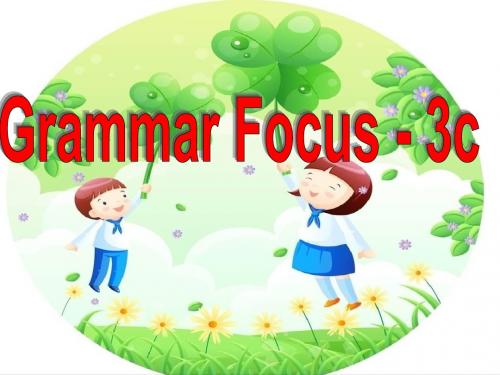

Unit 12 what did you do last weekend?教学反思上完这节课静静得反思自己本节课的思路及效果。
主要在培养学生良好的品质和终身学习的能力,题研究上注重科学探究的学习,关注体验性学习,提倡交流与合作、自主创新学习,在这方面有一些新的体会。
一、面向全体学生,为学生全面发展和终身发展奠定基础1、创设各种情景鼓励学生大胆地使用英语,对他们在学习过程中的失误和错误采取宽容的态度。
2、为学生提供自主学习和直接交流的机会,以及充分表现和自我发展的一个空间。
3、鼓励学生通过体验、实践、合作、探索等方式,发展听、说、读、写的综合能力。
4、创造条件让学生能够探究他们自己的一些问题,并自主解决问题。
二、关注学生情感,创造民主、和谐的教学气氛学生只有对自己、对英语及其文化有积极的情态,才能保持英语学习的动力并取得成绩,刻板的情态,不仅会影响英语学习的效果,还会影响其它发展,情态是学好英语的重要因素,因此我努力创造宽松民主、和谐的教学空间,做到:1、尊重每个学生,积极鼓励他们在学习中的尝试,保护他们的自尊心和积极性。
2、把英语教学与情态有机地结合起来,创造各种合作学习的活动,促进学生互相学习,互相帮助,体验成就感,发展合作精神。
3、建立融洽、民主的师生交流渠道,经常和学生一起反思学习过程和学习效果,互相鼓励和帮助,做到教学相关。
三、加强对学生学习策略的指导,让他们在学习和适用的过程中逐步学会如何学习1、积极创造条件,让学生参与到阶段性学习目标,以及实现目标的方法。
2、引导学生结合语境,进行学习。
3、引导学生在学习过程中,进行自我评价,并根据需要调整自己的学习目标和学习策略。
四、对学生进行有效的评价评价可以使学生认识自我,树立自信,有助于反思及调整自己的学习过程,评价或采用测验及非测验形式,平时重视形成性评价,对学生回答学习过程中的表现所改进的诚绩,及反映的情感、态度、策略某方面进行及时的评价,如有口头评价、学生之间互相评价等方法,充分发觉学生的进步,鼓励学生自我反思,自我提高,测验以学生综合运用能力为目标,侧重于学生理解和获取信息,能力减少客观题,增加主观题,通过评价学生学会分析自己的成绩和不足,明确努力方向。
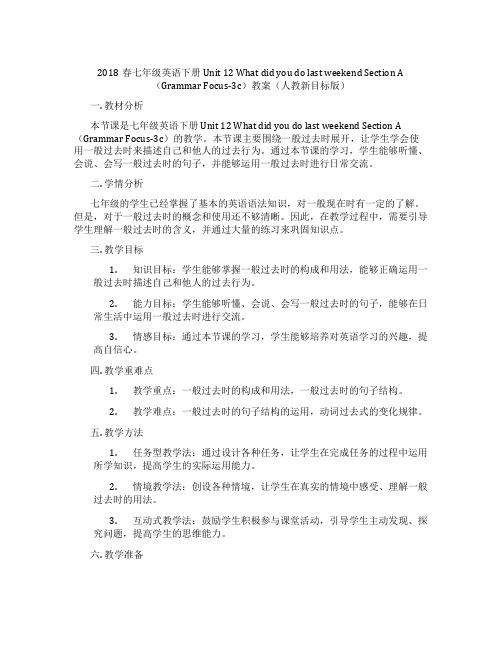
2018春七年级英语下册 Unit 12 What did you do last weekend Section A(Grammar Focus-3c)教案(人教新目标版)一. 教材分析本节课是七年级英语下册Unit 12 What did you do last weekend Section A (Grammar Focus-3c)的教学。
本节课主要围绕一般过去时展开,让学生学会使用一般过去时来描述自己和他人的过去行为。
通过本节课的学习,学生能够听懂、会说、会写一般过去时的句子,并能够运用一般过去时进行日常交流。
二. 学情分析七年级的学生已经掌握了基本的英语语法知识,对一般现在时有一定的了解。
但是,对于一般过去时的概念和使用还不够清晰。
因此,在教学过程中,需要引导学生理解一般过去时的含义,并通过大量的练习来巩固知识点。
三. 教学目标1.知识目标:学生能够掌握一般过去时的构成和用法,能够正确运用一般过去时描述自己和他人的过去行为。
2.能力目标:学生能够听懂、会说、会写一般过去时的句子,能够在日常生活中运用一般过去时进行交流。
3.情感目标:通过本节课的学习,学生能够培养对英语学习的兴趣,提高自信心。
四. 教学重难点1.教学重点:一般过去时的构成和用法,一般过去时的句子结构。
2.教学难点:一般过去时的句子结构的运用,动词过去式的变化规律。
五. 教学方法1.任务型教学法:通过设计各种任务,让学生在完成任务的过程中运用所学知识,提高学生的实际运用能力。
2.情境教学法:创设各种情境,让学生在真实的情境中感受、理解一般过去时的用法。
3.互动式教学法:鼓励学生积极参与课堂活动,引导学生主动发现、探究问题,提高学生的思维能力。
六. 教学准备1.教学课件:制作课件,展示本节课的主要内容,帮助学生直观地理解一般过去时的用法。
2.练习题:准备一些练习题,用于巩固本节课的知识点。
3.教学素材:准备一些与本节课主题相关的素材,如图片、视频等,用于创设情境。
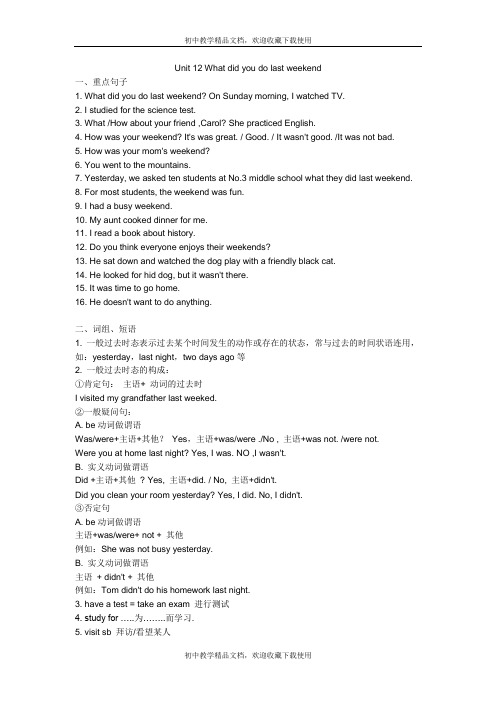
Unit 12 What did you do last weekend一、重点句子1. What did you do last weekend? On Sunday morning, I watched TV.2. I studied for the science test.3. What /How about your friend ,Carol? She practiced English.4. How was your weekend? It's was great. / Good. / It wasn't good. /It was not bad.5. How was your mom's weekend?6. You went to the mountains.7. Yesterday, we asked ten students at No.3 middle school what they did last weekend.8. For most students, the weekend was fun.9. I had a busy weekend.10. My aunt cooked dinner for me.11. I read a book about history.12. Do you think everyone enjoys their weekends?13. He sat down and watched the dog play with a friendly black cat.14. He looked for hid dog, but it wasn't there.15. It was time to go home.16. He doesn't want to do anything.二、词组、短语1. 一般过去时态表示过去某个时间发生的动作或存在的状态,常与过去的时间状语连用,如:yesterday,last night,two days ago等2. 一般过去时态的构成:①肯定句:主语+ 动词的过去时I visited my grandfather last weeked.②一般疑问句:A. be动词做谓语Was/were+主语+其他?Yes,主语+was/were ./No , 主语+was not. /were not.Were you at home last night? Yes, I was. NO ,I wasn't.B. 实义动词做谓语Did +主语+其他? Yes, 主语+did. / No, 主语+didn't.Did you clean your room yesterday? Yes, I did. No, I didn't.③否定句A. be动词做谓语主语+was/were+ not + 其他例如:She was not busy yesterday.B. 实义动词做谓语主语+ didn't + 其他例如:Tom didn't do his homework last night.3. have a test = take an exam 进行测试4. study for …..为……..而学习.5. visit sb 拜访/看望某人6. go to + 目的地go to Beijing去北京go home回家go there到那儿go here 到这儿注意:home,there,here是副词,副词前不加任何介词。
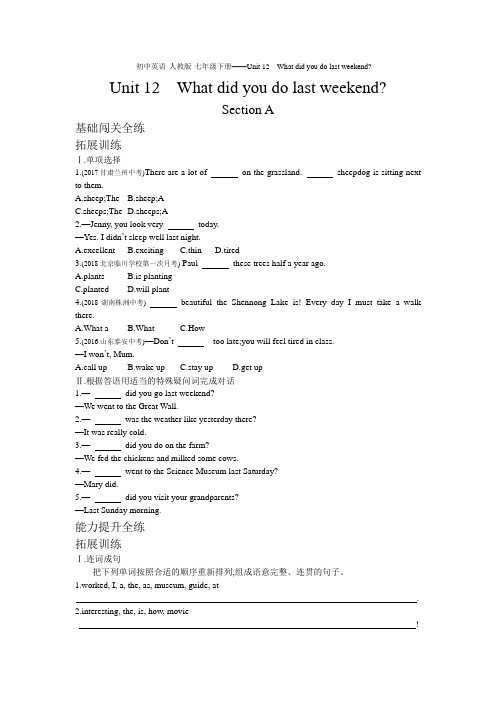
·人教版·七年级下册——Unit 12What did you do last weekend?Unit 12What did you do last weekend?Section A基础闯关全练拓展训练Ⅰ.单项选择1.(2017甘肃兰州中考)There are a lot of on the grassland. sheepdog is sitting next to them.A.sheep;TheB.sheep;AC.sheeps;TheD.sheeps;A2.—Jenny, you look very today.—Yes. I didn’t sleep well last night.A.excellentB.excitingC.thinD.tired3.(2018北京临川学校第一次月考) Paul these trees half a year ago.A.plantsB.is plantingC.plantedD.will plant4.(2018湖南株洲中考)beautiful the Shennong Lake is! Every day I must take a walk there.A.What aB.WhatC.How5.(2016山东泰安中考)—Don’t too late;you will feel tired in class.—I won’t, Mum.A.call upB.wake upC.stay upD.get upⅡ.根据答语用适当的特殊疑问词完成对话1.—did you go last weekend?—We went to the Great Wall.2.—was the weather like yesterday there?—It was really cold.3.—did you do on the farm?—We fed the chickens and milked some cows.4.—went to the Science Museum last Saturday?—Mary did.5.—did you visit your grandparents?—Last Sunday morning.能力提升全练拓展训练Ⅰ.连词成句把下列单词按照合适的顺序重新排列,组成语意完整、连贯的句子。

Unit 12 重点短语及句型背诵(留存备用考前复习)Key Phrases重点短语1. go to the cinema去电影院2. go boating去划船3.camp by the lake在湖边扎营4.go to the beach去海滩5. a weekend to remember一个值得记住的周末6. study for..为.....而学习7. the Natural History Museum自然历史博物馆 8. shout at .. 冲着.....大声喊叫9. see sb. doing sth.看见某人正在做某事 10. kind of tired有点累11. a second language第二语言12. soccer game足球赛13. 200 kinds of butterflies两百种蝴蝶 14. run away跑开15. have dinner with friends 和朋友起吃晚饭 16. fly a kite放风筝17. finish high school中学毕业 18.get a surprise吃惊19. swim in a swimming pool在游泳池里游泳 20. make a fire生火21. put up the tent搭帐篷 22. keep warm保暖23. so... that... 如此.. ... .以.至...... 24. go to sleep去睡觉25. look out of... .....外面看26. stay up late熬夜27. shout to... 对.....大声喊叫 28. each other互相;彼此29. play badminton打羽毛球 30. wake... up把... ... 弄醒31. up and down上上下下;起伏 32. go camping野营Key Sentences 重点句型1. What did you do last weekend? 你上周末做了什么?2. How was your weekend? 你周末过得怎样?3.I worked as a guide at the Natural History Museum. 我在自然历史博物馆当过导游。

What did you do last weeke ndC. Summar y and Self-exam in atio n.三、展示交流挑战一:观察与运用。
先组内讨论交流,然后由小组派代表就共性问题进行讲解。
针对学生的疑惑,教师给予点拨。
挑战二:机会就掌握在你手中,快将改编的对话在全班面前展示吧。
挑战三:… 相信你一定行!Come on!四、点拨升华A. camp的用法:camp既可作名词也可作动词。
作名词时,意为"营;营地;野营”;作行为动词时,意为“扎营;搭帐篷;宿营”常用短语有:go擦没评(去野营),summer camp (夏令营)等。
根据汉语提示填空。
(1) ____________________________________ When did you join the (夏令营)?(2) ____________________ I like (去宿营)in the open air.(3) ___________ We (宿营)in the forest last night.(4)Let' s go back to the ______ (营地)。
五、当堂练习.I. 单项选择()1.1 ______ m y homework yesterday.A. don ' t doB. didn ' t doC. didn 't()2. They went there by _______ .A. boatB. boatsC. boati ng()3. He ha d to go ________ there.A. campB. campsC. Camp ing() 4. They are having fun _____ the beach.A. onB. inC. at()5. We played badm inton ______ Sun day after noon.A. onB. inC. forn.用括号内所给单词的适当形式填空。
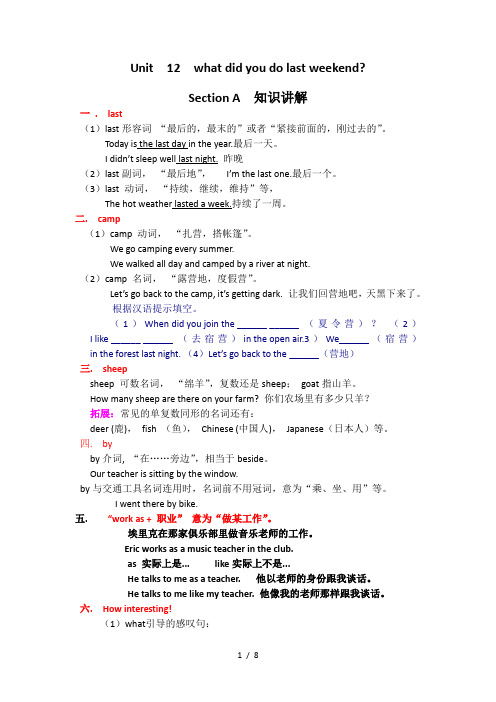
Unit 12 what did you do last weekend?Section A 知识讲解一. last(1)last形容词“最后的,最末的”或者“紧接前面的,刚过去的”。
Today is the last day in the year.最后一天。
I didn’t sleep well last night. 昨晚(2)last副词,“最后地”,I’m the last one.最后一个。
(3)last 动词,“持续,继续,维持”等,The hot weather lasted a week.持续了一周。
二. camp(1)camp 动词,“扎营,搭帐篷”。
We go camping every summer.We walked all day and camped by a river at night.(2)camp 名词,“露营地,度假营”。
Let’s go back to the camp, it’s getting dark. 让我们回营地吧,天黑下来了。
根据汉语提示填空。
(1)When did you join the ______ ______ (夏令营)?(2)I like ______ ______ (去宿营)in the open air.3)We______(宿营)in the forest last night. (4)Let’s go back to the ______(营地)三. sheepsheep 可数名词,“绵羊”,复数还是sheep;goat指山羊。
How many sheep are there on your farm? 你们农场里有多少只羊?拓展:常见的单复数同形的名词还有:deer (鹿),fish (鱼),Chinese (中国人),Japanese(日本人)等。
四. byby介词, “在……旁边”,相当于beside。
Our teacher is sitting by the window.by与交通工具名词连用时,名词前不用冠词,意为“乘、坐、用”等。

Un it 12 What did you do last weeke nd?I. Fill in the bla nks with the words in the box.(选用方框中所给词填空。
)clea ned, visited, watched, went, studied, played, was, wan ted 1. They ___ for the math test last ni ght. 2. Who ______ to the beach last weeke nd? 3. ___ your teacher busy last week?4. They went to the zoo, because they ______ to see the pan das.5. Linda _______ her uncle and aunt on weeke nd.6. My brother _______ computer games last Sun day.7. Joh n ______ a soccer game over the weeke nd.8. Lucy ______ her room last Saturday morning. II. Finish the questio ns and an swers. (完成问句和答语。
)1. Whatover the weeke nd?He played soccer.2. What ___________________ on Sun day? We did our homework.3. What did they do on Saturday?They _____ to the library and _______ for the scie nee test. 4. What did Lisa do on Sun day morning? She______ tennis with her friend.5. What _____ your brother __________ last Saturday after noon? Hehis room.6. ____ did you do on Saturday evening? I ____ to the movies.7. ___ did your pare nts do on Sun day after noon? They _____ TV.8. What ___ your sister _______ over the weeke nd? She______ computer games. III. Choose the best an swer.(单项选择。
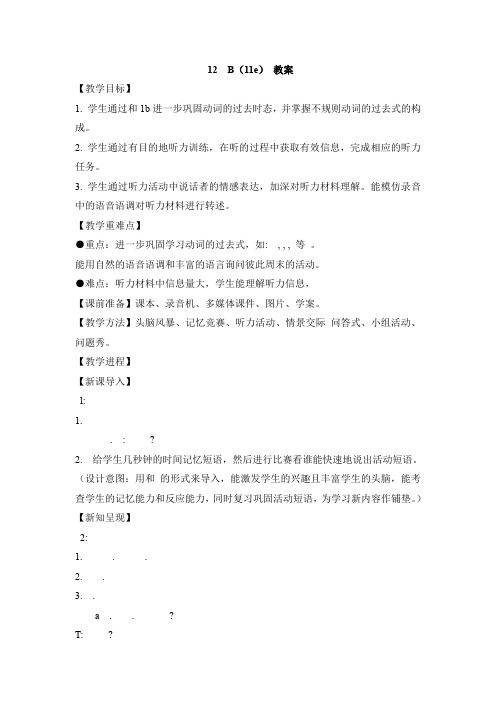
12 B(11e)教案【教学目标】1. 学生通过和1b进一步巩固动词的过去时态,并掌握不规则动词的过去式的构成。
2. 学生通过有目的地听力训练,在听的过程中获取有效信息,完成相应的听力任务。
3. 学生通过听力活动中说话者的情感表达,加深对听力材料理解。
能模仿录音中的语音语调对听力材料进行转述。
【教学重难点】●重点:进一步巩固学习动词的过去式,如: , , , 等。
能用自然的语音语调和丰富的语言询问彼此周末的活动。
●难点:听力材料中信息量大,学生能理解听力信息,【课前准备】课本、录音机、多媒体课件、图片、学案。
【教学方法】头脑风暴、记忆竞赛、听力活动、情景交际问答式、小组活动、问题秀。
【教学进程】【新课导入】l:1.. : ?2. 给学生几秒钟的时间记忆短语,然后进行比赛看谁能快速地说出活动短语。
(设计意图:用和的形式来导入,能激发学生的兴趣且丰富学生的头脑,能考查学生的记忆能力和反应能力,同时复习巩固活动短语,为学习新内容作铺垫。
)【新知呈现】2:1. . .2. .3. .a . . ?T: ?S: a .T: ?S: a( .)4. 1bT: ? a . . , a a .(设计意图:通过对每幅图片的描述,引导学生由使用旧知识过渡到自主使用新知识,达到了自然呈现的目的。
1b使用评价性的语言区分有趣和无趣的活动,通过练习学生能够完整地表达自己或他人的周末。
)【新知学习】3: 1c1. .( . T: . ? a . . , .): , ! .: . I . I .: ?: .: ?: , I a .: ? , ?: , . , I . ? ?: , I . , I a . , I .: ! !: , I . !(设计意图:教师导入听力语境,让学生明白听力要谈论话题是什么。
并且为1c的表格作铺垫,降低听力难度。
)2. .(学法指导:在听的过程中重点感受语气词的语音语调。
)3. . ? .(学法指导:由于此部分所填信息较多,播放第一遍听力时,教师可以引导学生先在旁边写重点词汇,播放第二遍听力时再核对信息,将信息转移到1c的表格中。

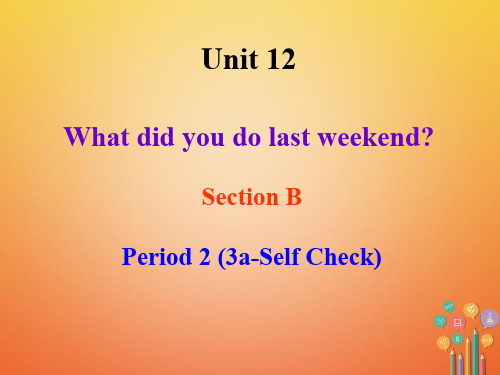
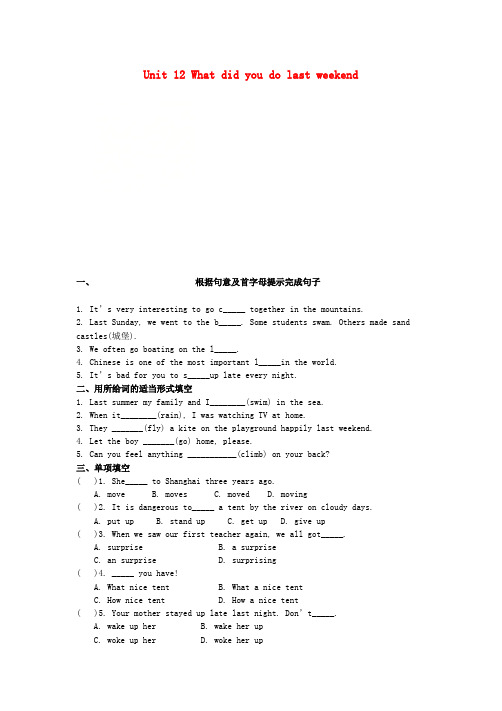
Unit 12 What did you do last weekend一、根据句意及首字母提示完成句子1. It’s very interesting to go c_____ together in the mountains.2. Last Sunday, we went to the b_____. Some students swam. Others made sand castles(城堡).3. We often go boating on the l_____.4. Chinese is one of the most important l_____in the world.5. It’s bad for you to s_____up late every night.二、用所给词的适当形式填空1. Last summer my family and I________(swim) in the sea.2. When it________(rain), I was watching TV at home.3. They _______(fly) a kite on the playground happily last weekend.4. Let the boy _______(go) home, please.5. Can you feel anything ___________(climb) on your back?三、单项填空( )1. She_____ to Shanghai three years ago.A. moveB. movesC. movedD. moving( )2. It is dangerous to_____ a tent by the river on cloudy days.A. put upB. stand upC. get upD. give up( )3. When we saw our first teacher again, we all got_____.A. surpriseB. a surpriseC. an surpriseD. surprising( )4. _____ you have!A. What nice tentB. What a nice tentC. How nice tentD. How a nice tent( )5. Your mother stayed up late last night. Don’t_____.A. wake up herB. wake her upC. woke up herD. woke her up四、按要求完成句子1. She had much fun on vacation.(改为否定句)She_____ _____ much fun on vacation.2. Children enjoy themselves playing games.(改为同义句)Children_____ ______ playing games.3. My parents often help me with my lessons.(改为同义句)My parents often_____ me_____ my lessons.4. He walked back to the hotel.(改为同义句)He went back to the hotel_____ _____.5. Today the weather is cool.(就画线部分提问)_____ _____ the weather today?答案一、1. camping 2. beach 3. lake 4. languages 5. stay二、1. swam 2. rained 3. flew 4. go 5. climbing三、1-5 CABBB四、1. didn’t have 2. have fun 3. help; do 4. on foot5. How is2。
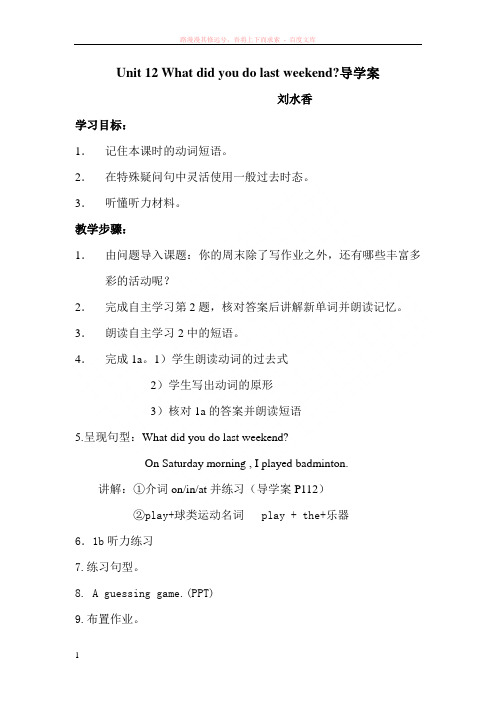
Unit 12 What did you do last weekend?导学案
刘水香
学习目标:
1.记住本课时的动词短语。
2.在特殊疑问句中灵活使用一般过去时态。
3.听懂听力材料。
教学步骤:
1.由问题导入课题:你的周末除了写作业之外,还有哪些丰富多彩的活动呢?
2.完成自主学习第2题,核对答案后讲解新单词并朗读记忆。
3.朗读自主学习2中的短语。
4.完成1a。
1)学生朗读动词的过去式
2)学生写出动词的原形
3)核对1a的答案并朗读短语
5.呈现句型:What did you do last weekend?
On Saturday morning , I played badminton.
讲解:①介词on/in/at并练习(导学案P112)
②play+球类运动名词 play + the+乐器
6.1b听力练习
7.练习句型。
8. A guessing game.(PPT)
9.布置作业。

Unit12 What did you do last weekend?知识点详解单元目标总览:【知识点详解】1、camped by the lake在湖边扎营(1)①camp 作动词,意为“扎营,搭帐篷”。
◆We go camping every summer. 我们每年夏天都去野营。
◆We walked all day and camped by a river at night.我们走了一天,晚上在一条河边宿营。
②camp 作名词,意为“露营地,度假营”。
◆Let’s go back to the camp, it’s getting dark. 让我们回营地吧,天黑下来了。
◆We spent two weeks at camp this summer. 我们今年夏天在度假营玩了两周。
(2)by介词, 意为“在……旁边”,表示位置,相当于beside。
◆Our teacher is sitting by the window. 我们老师坐在窗户旁边。
拓展:by作介词的其他常见用法:(1)表示移动方向,意为“经过”。
◆My mother goes by the building every day. 我妈妈每天从这栋楼旁边经过。
(2)表示方式及手段,意为“用,靠,通过”。
◆He makes a living by fishing. 他以捕鱼为生。
(3)与交通工具名词连用时,名词前不用冠词,意为“乘、坐、用”等。
◆I went there by bike. 我骑自行车去那儿的。
6. tired2、What did you do last weekend?上周末你做什么?What+did+主语+谓语动词原形+其他,这一特殊疑问句用来询问某人在过去某个时间或地点做过什么事情,其中did为助动词,没有人称和数的变化,谓语动词为实义动词原形。
◆—What did you do last night?昨晚你做了什么?—I visited my uncle.我看望了我的叔叔。

Unit 12 What did you do last weekend一般过去时(二)在Unit 11中,我们学习了一般过去时陈述句与一般疑问句,本单元我们将学习一般过去时特殊疑问句。
请仔细观察下面例句,然后补全结论局部所缺内容。
【观察】1. How was your trip last week2. Where were you yesterday afternoon3. What did you do just now4. When did your father arrive in Beijing5. Who helped you with your homework this afternoon【结论】1. 例句1-5均为特殊疑问句。
2. 例句1-4构造为“疑问词 + 一般疑问句〞。
其中,由句1与句2可知,含有be动词一般过去时特殊疑问句为“疑问词 + ________ + 主语 + 其他〞;由句3与句4可知,含有实义动词一般过去时特殊疑问句为“疑问词 + ________ + 主语 + 动词原形 + 其他〞3. 由句5可知,疑问词在句中作主语时,一般过去时特殊疑问句为“疑问词 + ________ + 其他〞。
Key: 2. was / were; did 3. 动词过去式【运用】Ⅰ.对划线局部提问。
1. They left Guangzhou last month.________________________________________2. I watched a basketball game on TV this morning.________________________________________3. His grandpa took many photos in the park yesterday.________________________________________4. We had a New Year’s party in his home last night.________________________________________5. The weather was very bad yesterday.________________________________________Ⅱ.汉译英1. 昨天他们是怎么去北京?________________________________________2. 谁刚刚在你办公室?________________________________________答案Ⅰ. 1. When did they leave Guangzhou2. What did you do this morning3. Who took many photos in the park yesterday4. Wh ere did you have a New Year’s party last night5. How was the weather yesterday / What was the weather like yesterdayⅡ. 1. How did they go to Beijing yesterday2. Who was in your office just now。
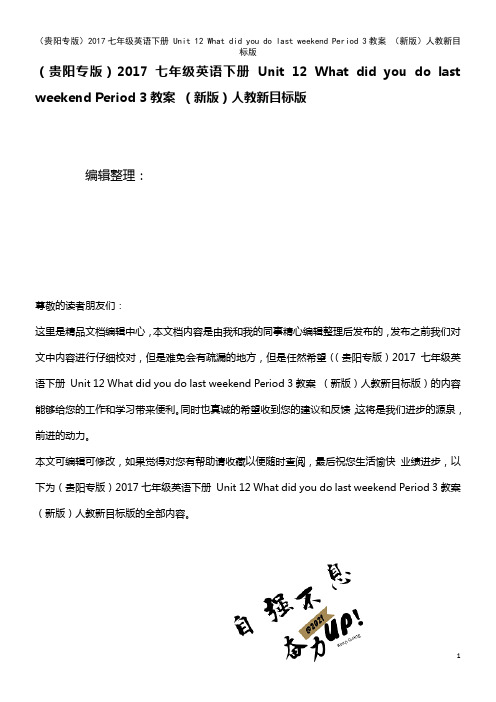
(贵阳专版)2017七年级英语下册Unit 12 What did you do last weekend Period 3教案(新版)人教新目标版编辑整理:尊敬的读者朋友们:这里是精品文档编辑中心,本文档内容是由我和我的同事精心编辑整理后发布的,发布之前我们对文中内容进行仔细校对,但是难免会有疏漏的地方,但是任然希望((贵阳专版)2017七年级英语下册Unit 12 What did you do last weekend Period 3教案(新版)人教新目标版)的内容能够给您的工作和学习带来便利。
同时也真诚的希望收到您的建议和反馈,这将是我们进步的源泉,前进的动力。
本文可编辑可修改,如果觉得对您有帮助请收藏以便随时查阅,最后祝您生活愉快业绩进步,以下为(贵阳专版)2017七年级英语下册Unit 12 What did you do last weekend Period 3教案(新版)人教新目标版的全部内容。
Unit 12 What did you do last weekend?Period3 SectionB 1a-1e【教学目标】知识与技能(1)熟练掌握下列词汇:fly, kite, fly a kite。
(2)熟练掌握下列短语:Far away from= far from 离。
远 Flew a kite 放风筝Fly to..。
坐飞机去.。
.。
/ 飞去 How time flies 时间飞逝啊(3)掌握下列句型:-Did you do anything interesting last weekend?—Not really, but I visited my sister。
—My sister finished high school two weeks ago。
过程与方法活动与短语搭配,讨论什么活动是有趣什么活动是无聊的,听力练习,创作新对话情感、态度与价值观教育学生合理安排作息时间,健康生活.【教学重难点】重点:1. 继续学习表示活动的短语,及动词过去式.2. 继续学习使用一般过去式态谈论过去发生的事情。
Unit 12 What did you do last weekend?Written test part (共80分)Ⅳ.单项选择(每小题1分,共10分)从A、B、C、D四个选项中选择可以填入空白处的最佳答案。
( )16. Peter, do you know who is the first man to walk on _______ moon?A. aB.anC. theD. 不填( )17. Mr. Black worked _______ a guide in Canada two years ago.A. forB. asC. ofD. about( )18. Look! These _______ are playing near the apple tree.A. sheepB. cowC. horseD. chicken( )19. Mary was _______ after work, so she went to bed early.A. lazyB.tiredC. strictD. quiet( )20. I saw Helen _______ in the music room just now.A. dancingB. to danceC. dancesD. to dancing( )21. —Who _______ this morning?—My mother.A. woke up youB. woke you upC. wakes up youD. wakes you up( )22. My aunt started _______ the kitchen at 2:00 p.m.A. to cleaningB. cleanedC. cleanD. to clean( )23. —Where ______ you yesterday morning?—I ______ at my uncle’s home.A. were; amB. are; amC. are; wasD. were; was( )24. —_______?—They went to summer camp.A. When did they go campingB. Where were they campingC. What did they do on vacationD. Why did they go on vacation( )25. —How interesting the boat race is!—_______.A. Sounds goodB. Yeah, it is funC. Lucky youD. Great, thanksⅤ.完形填空(每小题1分,共10分)先通读下面的短文,掌握其大意,然后从A、B、C、D四个选项中选择可以填入空白处的最佳答案。
My old friend is Sandy. Sandy and I 26 thirty years ago when we were five years old. It was 27 first day at school and I was very 28 because I wanted my mother. Sandy gave me 29 box of candies and we became (变成) friends. We were together nearly every day until (直到) we 30 high school.Then I went to university (大学), 31 Sandy didn’t. She married (结婚) when she was just twenty and had three children. I didn’t see her32 . Sometimes we didn’t meet for months. But we often talked33 the telephone.Now I’m married, too. I34 near Sandy so we meet every week. She’s a student now and I have a 35 , so we have a lot to talk about.( )26. A. sang B. relaxed C.shopped D. met( )27. A. her B. my C. hers D. mine( )28. A. friendly B. unhappy C.lucky D. noisy( )29. A. a B.an C. the D. 不填( )30. A. visited B. joined C.left D. used( )31. A. and B.so C. because D. but( )32. A. often B. later C.soon D. again( )33. A. with B. on C.in D. at( )34. A. sit B. play C.live D. sleep( )35. A. pet B. car C. violin D. babyⅥ.阅读理解(每小题2分,共20分)❋A❋In my free time I usually read books. I love reading storybooks. On the weekend I often go to bookstores. I also like doing the puzzles (智力游戏). Sudoku is my favorite puzzle.JimOn the weekend I usually do sports —football, basketball and other things. When I’m at home I often play computer games with my brother. Sometimes I watch movies.I like action movies (动作影片) best.Danny I don’t like reading or doing sports. In my free time, I sometimes go fishing with friends. We play board games (棋类游戏), too. Our favorite is Go. But I also like sitting and doing nothing and just watching the world around me.Tina 根据材料内容选择最佳答案。
( )36. On the weekend, Jim often goes to ______.A. the libraryB. the cinemaC. bookstoresD. his friend’s home( )37. What does Danny usually do on the weekend?A. He plays sports.B. He reads books.C. He watches movies.D. He does the puzzles.( )38. What is Go?A. A puzzle.B. A board game.C. A movie.D. A computer game.( )39. Who likes sitting and watching the world?A. Danny.B. Danny’s brother.C. Tina.D. Tina’s friend.( )40. This material mainly talks about ______.A. how the kids exercise at homeB. what the kids do in their free timeC. who the kids play with after schoolD. where the kids spend their weekend❋B❋This happened (发生) about two years ago. I went to an art festival in France with my friends. The festival would last (持续) 5 days.When we arrived the weather was great. It was very hot and sunny, so we went to the mountains for camping. But in the mountains the weather changed (变化) quickly. That night there was a terrible storm. At first we didn’t worry about it, but it started to rain heavily and there was a strong wind. A little later, water started coming into the tent. In the end, we had to leave and take our things to a hotel. There weren’t any rooms free, so they let us sleep in the dining room. The next morning it was sunny again. Bu t our tent wasn’t there. The wind blew it away at night.根据材料内容选择最佳答案。
( )41. Where did the writer go for the art festival?A. To China.B. To the UK.C. To the USA.D. To France.( )42. How was the weather when the writer arrived?A. Rainy and windy.B. Snowy and cold.C. Rainy and cool.D. Sunny and hot.( )43. The underlined word “storm” means “______” in Chinese.A. 暴风雨B. 雨夹雪C. 冰雹D. 大雾( )44. Where did the writer sleep that night?A. At home.B. In a hotel.C. In the tent.D. At a friend’s home.( )45. Which of the following is TRUE?A. The art festival was one week long.B. The writer didn’t enjoy the camping.C. The writer couldn’t find his bag the next morning.D. The bad weather in the mountains lasted two days. Ⅶ.情景交际(每小题1分,共5分)根据对话内容,在空白处填入恰当的句子,使对话完整、通顺。